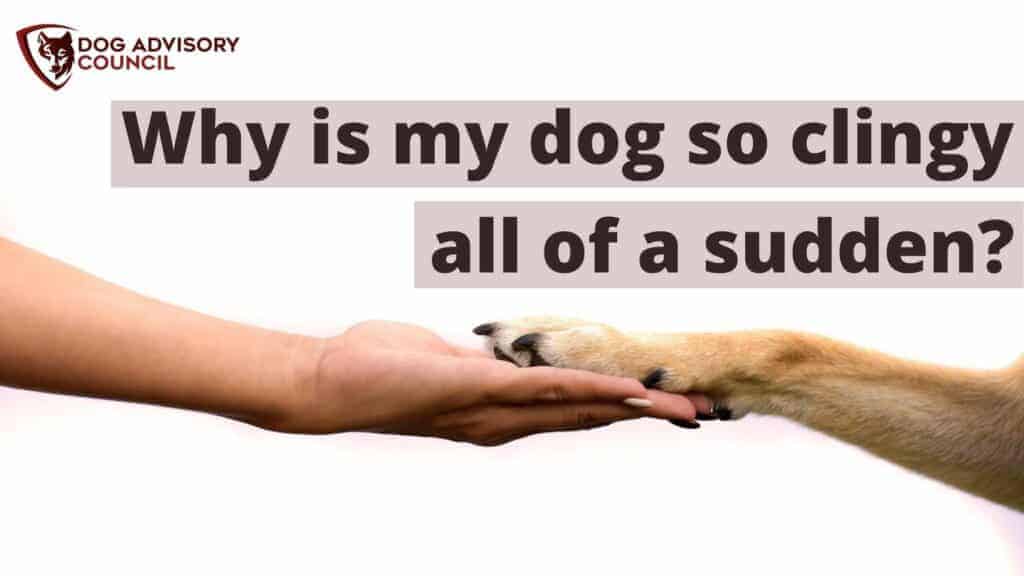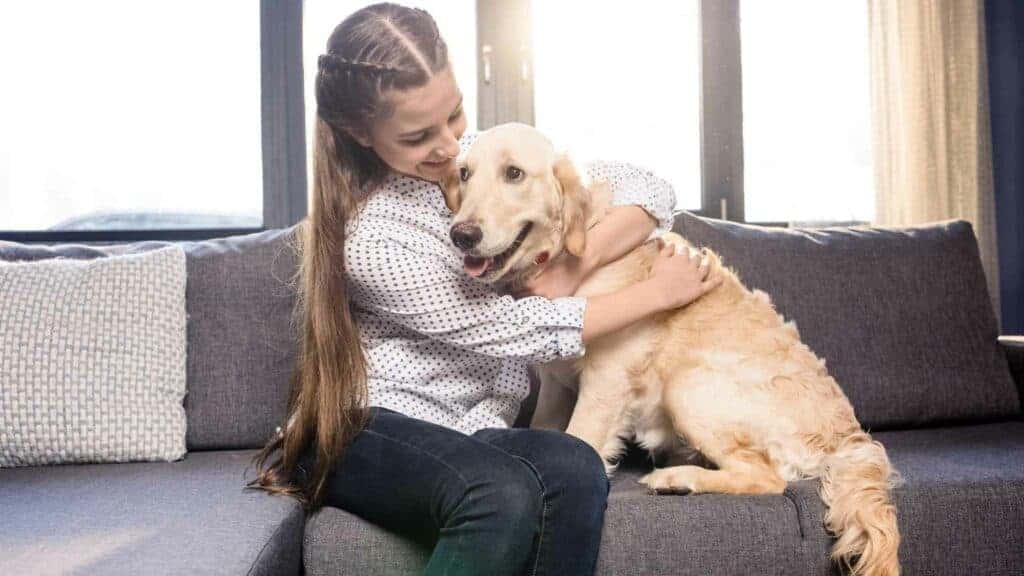
Whether you have a velcro dog or a suddenly clingy pet that just won’t leave you alone for 5 seconds, it can be cause for concern for attentive pet parents. Wondering just what to do about it? Support and information are waiting below!
If you notice your dog is clingy all of a sudden, he is most likely feeling anxious or fearful. He also may be bored and/or missing you more than normal in case of life changes. Sometimes dogs can become clingy all of a sudden if they’re sick or in heat, too. Below, you’ll learn about why your dog may be clingy, when you should worry about it, and how to get your personal space bubble back!
Why is my dog being clingy? 6 Causes
First up, take a moment and take a look at your dog’s behavior. Is his clinginess out of the ordinary, or is it just a part of their curious and loving personality (more on that later)? The sudden clinginess is most often a sign of some change or shift in your dog’s life. Some of the most common causes for sudden clinginess include:
- He’s anxious/fearful
- He’s assessed a threat
- He’s bored
- He’s been missing you a lot lately
- He’s sick or in pain
- She’s in heat/going into labor
1. He’s clingy because of anxiety or fear
Think of your dog as a kid, basically. If the dog is anxious or afraid, he’ll search out for his owners and want to be at their side until he feels safe and calm again. You are his place of comfort and safety, which is kind of adorable when you think about it!
2. He’s clingy because of a threat
This threat could be something actually dangerous like an intruder or a stranger in your home. But, it could also be something as simple as adding a new furry friend, such as a puppy or cat, or it could be a new person or a baby, etc. All of these are threats to your dog, and he’ll become clingy to protect you from the threat until he learns that the toddler is not, in fact, a threat at all!
3. He’s clingy because of boredom
As easy as dogs are to entertain (hello, leaf!), they can also bore easily. If you’re gone to work all day or their other human family doesn’t interact with them, or even if you’re simply at home but doing your own thing, he’ll cling to you to remind you, “Hey, I’m here, pay attention!”. If it’s happening more than usual, it’s because he’s really feeling the boredom and is telling you he needs stimulation.
4. He’s clingy because he’s missing you
Cute, right? Dogs miss us terribly when we’re gone. They also don’t seem to have any concept of time, so being gone for 2 minutes is the same as being gone for 2 days for them. If they feel you’ve been gone for too long, they’ll let you know by being clingy.
5. He’s clingy because of sickness or pain
Whether it’s the equivalent of the dog sniffles, or something like arthritis, or even something more serious, he’ll seek you out for comfort and reassurance. Sometimes this is obvious by limping or swelling, or sometimes it’s a bit more subtle and can be hard to pick out.
6. She’s is clingy because she’s in heat or going into labor
In the case that our dog isn’t spayed and/or is pregnant, many will let you know when they are going into heat and/or labor. It’s more of a heads up, Mom/Dad” situation. IN these cases, you’ll want to pay attention to them and keep an eye on them to make sure they are doing okay!
What’s the difference between clingy VS velcro dogs?
There is a difference between clingy dogs and velcro dogs, both of which can be temporary or long-term, depending!
A clingy dog is going to hang out with you and then immediately get anxious when you step out of their range of touch. If you go to the bathroom, they’ll hurdle after you and attach themselves to your side. If you get up to answer the phone, they’ll immediately press into your side as soon as they can physically follow you. When you leave, they’ll bark and get frantic that they can’t get up to you.
A velcro dog, on the other hand, likes to be in contact with you, from his head on your lap to pressing up against your feet in bed to sitting on your food (ouch) while you’re on the computer. These dogs don’t tend to be necessarily anxious, but they love to be touching you and will often look adoringly in your direction. He’ll be dejected when you leave, but otherwise, okay.
Some dogs enjoy sleeping nearby and hanging out with their favorite human. But others simply must be physically touching you as much as possible, as often as possible. It’s all about personality!
6 Solution to get your personal space back
Feeling frustrated with your clingy pet? It’s okay. It doesn’t mean that you are a bad pet parent. When it comes to getting your space back, the most important thing is to be patient and never punish the dog’s behavior. No matter how annoying it may seem to you, remember that his clinginess is a biological instinct, and he’s trying to tell you something. The techniques depend a lot on the cause, so take a look.
- Anxiety and fear: learn the triggers and work with them
- Threat/danger: show your dog that you’re all safe
- Boredom: toys or a buddy
- Missing you: dedicated one-on-one time
- Illness: vet check-up
- Heat or labor: Comfort and medical attention
1. Anxiety and fear: learn the triggers and work with them
Some anxieties and fears, such as fireworks or police cars, are common on dogs. Others are more specific, such as mosquitos or the can opener. Whatever your dog’s triggers are that cause their clinginess, offer them comfort and work on retraining their anxiety panics and fear triggers gradually and at your dog’s pace. If you have a dog with separation anxiety panics, this will help, depending on how serious the case is, and teach that they can give you breathing space without feeling totally abandoned.
2. Threat/danger: show your dog that you’re all safe
If they sense a threat that they’re protecting you against (one that you know is harmless), help them understand that the threat is actually a friend. If it’s a toddler or a baby, show them that they are another person to protect. If it’s a stranger, help them see the new person as a play buddy.
3. Boredom: toys or a buddy
A bored dog will need one or both of these things: some toys or a buddy! Get interactive puzzle toys, for instance, or a new friend to play with when you are gone to work all day. This will keep them happy and healthy, too, which is always great.
4. Missing you: dedicated one-on-one time
If they’re missing you, then the simple way to help them cling less is to spend lots of time with them. No phone or TV or anything like that. Dedicated cuddle and snuggle time, or walks, or whatever else your dog loves most.
5. Illness: vet check-up
If you suspect that your dog is sick or just not feeling like himself, or obviously in pain, a trip to the vet is definitely a great thing! Since dogs don’t show pain the same way humans do, it’s important to know what is (or is not) happening with your dog’s health!
6. Heat or labor: Comfort and medical attention
For the dog in heat or labor, you’ll want to keep her close and watch for any signs of distress. If she wants comfort, offer it freely! If she is having a problem or seems agitated past the point of comfort (for you), don’t hesitate to call the veterinarian! After both or either of these situations, getting her spayed is always a good idea to prevent this from being a problem in the future!

Is it okay to stop my dog from being clingy?
Yes, you can retrain your dog’s behaviors once you understand where it’s coming from. A dog’s clinginess isn’t something you have to put up with. The amount of time and effort it takes will vary depending on the dog and the situation, of course. If you need help doing just that, you can talk with the veterinarian for some tips!
A clingy dog can be frustrating when you’re trying to move around the house freely, but this is an important sign to pay attention to in your dog’s behavior. These tips will help you get to the bottom of it and give yourself your space back!
Conclusion
If your dog is suddenly clinging, they could be scared, protective, bored, missing you, sick, or in pain. If you need help retraining this dog behavior, taking the right steps is important to do it the right way for everyone’s health and happiness!
Did some of these reasons for clinginess surprise you? Do you know someone who will find this information valuable? Share it with them and spread the wealth!
